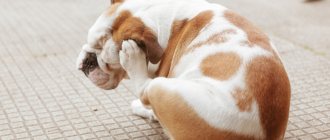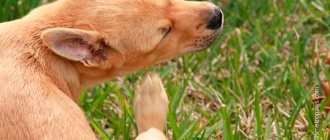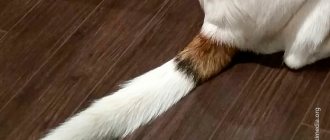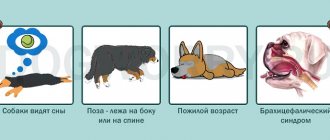Dogs make gestures that can be adorable and even funny to humans, such as when they tilt their head slightly when you speak to them. They do this to better perceive the sounds you make when you speak, and this is completely normal behavior.
However, sometimes dogs persistently shake their heads from side to side, indicating that something bad is happening. Knowing how to spot the symptoms will help you better communicate what's wrong to your veterinarian so they know how to care for your dog. If you want to know why your dog shakes his head frequently, don't miss this article.
The dog shakes its head and scratches its ear
Sometimes a foreign object can become lodged in your dog's ear canal for a variety of reasons. For example, during the summer and spring, when dogs tend to have more freedom to go out and play outside the house, outdoor activities can transfer thorns or other debris into your dog's ears, causing him great discomfort.
Likewise, if you have children, it is likely that at some point they will find it funny to put an object in a dog's ears, so interactions with a pet should always be supervised by an adult. Also, remember to teach your little ones at home the care and respect they should show to all animals.
In both cases, the presence of a foreign object in the ears will cause pain in the dog, causing the dog to shake its head, both in an attempt to relieve the discomfort and in an attempt to remove it. This, however, is counterproductive, since it is possible that the residue will penetrate further into the ear canal, even piercing an area.
Only a veterinarian will be able to determine if this is the reason why your dog shakes his head frequently. In this case, minor surgery may be required to remove the object.
© shutterstock
Why is this happening
Ear diseases
After sleep, dogs shake their heads and scratch, which is normal for them, as well as some earwax. But if your pet shakes its head and ears constantly, and there is an unpleasant odor coming from the ears, this should alert you.
Animals suffer from ear diseases much more often than we think. The dog often shakes its head violently, but the owner does not pay attention to it. The pet has no choice but to suffer in silence. After all, he cannot say anything, but only points out the problem with his behavior. If a dog whines, his temperature rises, his ears swell, and there is an unpleasant odor coming from his ears, this indicates that the animal has an otolaryngological disease.
Otitis media is common. This disease is caused by bacteria that cannot be completely eliminated from the animal's body. In the case when the body is able to give a strong immune response, microorganisms do not manifest themselves, but as soon as the body is weakened as a result of an unbalanced diet, the manifestation of the disease is obvious. A dog may also scratch its ears if it is allergic to a certain food product.
If a pet “caught” an ear mite, then a very strong inflammatory process develops. The animal is itching and shaking its ears. Dogs that have an open ear canal, as well as lop-eared breeds, are susceptible to such diseases. A black ear inside may indicate the presence of a tick.
With fungal infections, red-brown discharge appears in the ears, which has an unpleasant odor.
Injury
Ear injuries are common in many dog breeds. This can also cause anxiety in your pet. Dogs with long, sensitive ears should be carefully examined after each walk for signs of injury.
Foreign object or water
This is the only non-disease-related case where a dog shakes its head. In such a situation, you should not do anything yourself, but immediately contact a veterinary clinic. In order to remove a foreign body, the possibility of movement of the animal should be excluded. Otherwise, the four-legged friend will behave restlessly and turn his head, as a result of which the foreign object may penetrate even deeper.
Another common cause of head shaking is water getting into your ears. This happens when it rains and when swimming in ponds. If the water is clean, then nothing bad will happen. However, if the water is from a stagnant body of water, then microorganisms may enter the auricle. causing various infectious diseases.
In all other cases, the answer to the question of why a dog shakes its head is the presence of a disease.
The dog often shakes its head due to mange
Mange is one of the serious health problems that affects dogs. Although it is not difficult to treat, it causes a lot of discomfort for your dog and if not treated promptly, the condition can get worse.
Localized demodicosis mainly affects the ears of dogs, causing severe itching and dark earwax. The dog will frequently shake its head, wiggle its ears, and even scratch vigorously to relieve the itching, but this will only bruise the ears. There are different treatments available to treat this type of mange, so contact your veterinarian as soon as possible.
Wounds and abrasions on the head cause severe discomfort for the dog
If a dog shakes its head, the reasons may lie not only in internal processes. Wounds and abrasions can also cause discomfort for a dog: the deeper the wound, the longer and more unpleasant it will be to heal. If the wound does not require stitches, it is recommended to disinfect it and put a protective collar on the dog to prevent scratching of the wounds.
Until complete healing, you need to carefully monitor the damaged tissues; this will help you notice inflammation in time and take action. If there is redness, pus, or swelling in the area of the injury, you must immediately take the dog to the veterinarian. Self-medication in this case can only worsen the situation.
The dog shakes its head and wiggles its ears because it has otitis media.
Canine otitis media is an infection that develops in the outer part of the ear. It begins as an inflammation caused, in most cases, by penetration of the ear canal, which promotes the appearance of bacteria and therefore infection.
Symptoms include:
- Shaking your head
- Visible inflammation of the ear
- Sulfur release
- Bad smell
- Strong pain
- Itching
- Nervous behavior
- Ear covering
There are different types of canine otitis, which are classified depending on the pathogen that causes it. Thus we have:
- Mycotic otitis: fungi are the culprits.
- Bacterial otitis media: microorganisms multiply due to inflammation.
- Earwax: Some dogs develop excess earwax, which can lead to bacteria if it is not removed with proper hygiene.
Any of these types of ear infections are dangerous for a dog because if they are not treated promptly, the infection will spread, damaging the eardrum and causing permanent deafness and even neurological problems if the bacteria reaches the brain.
Fungal and bacterial ear infections
There are a lot of crusts inside the ear, the dog is shaking its ears, how to treat it? Canine otomycosis (a fungal infection of the ears) and microbial infections of the outer ear often occur simultaneously. Their symptoms are mostly similar - redness inside and near the ear, the dog scratches the ear and whines, discharge of clear fluid or pus. With fungus, round bald patches or areas with “broken off” hairs are often visible. Infections should be treated by proper ear cleaning with antiseptics. Then drops with antibiotics and antifungal drugs (clotrimazole, nitrofungin, etc.) are used.
!! The diagnosis of otomycosis can be made only after examining a smear under a microscope. Upon examination, one can only guess.
Are the blood vessels inflamed?
Inflammation of the blood vessels in the ear, also called vasculitis, has different causes, whether it is due to a bite, exposure to cold, or a wound that is worsened by contact with flies, among other reasons, and why your dog shakes his head a lot.
Symptoms:
- Itching
- Pain
- Ear infection
- Scabs
- Thickening of the ear
- Ulcer formation
As we say, the discomfort caused by the inflammation of the blood vessels causes the dog to shake its head, causing it to hit the ears harder, leaving bruises in the area.
Bruises on ears
These bruises are not only caused by inflammation of the blood vessels, but any of the mentioned reasons due to which the dog often shakes its head from side to side will lead to bruising if the ears are hit during this process.
© shutterstock
These bruises are also only visible if the blood vessels have ruptured due to the shaking, further exacerbating the problem as this inflammation adds to the overall discomfort the dog is already experiencing. To stop the deterioration, the underlying cause of the discomfort must be addressed.
Why is your dog having these problems?
Now that you know all the reasons that may explain why your dog frequently shakes his head and scratches his ears, you're probably wondering if there are factors that predispose him to developing any of these problems.
Among these factors, the following can be noted::
- Your dog's ears are too long or floppy . This is a feature that we find very admirable, but this type of ear obstructs the passage of air, so bacteria can easily grow inside the ear.
- Your dog has very furry ears . Many breeds with a lot of fur grow hair not only on the body, but also inside the ears, where it mixes with earwax and predisposes the dog to ear infections.
- Your dog's coat is very oily . As with human hair, some dogs have oilier fur, which predisposes them to canine seborrhea and earwax problems.
- Your dog loves water . Many dogs enjoy hanging out at the beach, lake, or just using the garden hose, but if moisture gets into their ears, bacteria can grow.
- Your dog needs better hygiene . When bathing and grooming dogs, their ears are often forgotten, so failure to comply with hygiene rules contributes to the accumulation of earwax with the ensuing consequences.
General information
REFERENCE! There is a caste of owners who do not want to wash their dog. For man's faithful friend, washing is mandatory once every three days! Otherwise, there is a risk of finding lice (animals) or fleas. The animal may shake its head because it lacks cleanliness.
There are only three painful reasons why your pet’s ear will itch and his head will shake:
- Pain from illness. A common symptom of internal otitis is acute pain. A dog will never be able to tell you that his ear hurts, and you are unlikely to ask. If you ask yourself: “why does a dog often scratch its ears,” then otitis media could be the cause;
- Tumor. The thing is more terrible than simple otitis media. Tumors are rarely internal, and otherwise you will have to take your pet to the veterinary clinic. To find it, do a simple inspection. The tumor is either in the ear itself or outside. The dog will let you know about this;
- An unpleasant smelling liquid leaks from the ears. Pathological symptoms often lead to what is called “pus”. Bruise, otitis media, dirt damage - all this entails the release of an unpleasant odor. And again the same advice: examine the dog.
REFERENCE! Check your dog at least once a week. A full examination will not take you 30 minutes (a whole article about this will appear soon), and you will significantly save on the veterinarian in the future, and on the ailments of your faithful friend in the present. Please spend time with your dog in more than just playtime.
Tips to avoid ear problems
Hygiene and grooming for your dog are essential to keeping him healthy and preventing illness, so here are some tips to help you avoid ear problems:
- Remove earwax using ear drops and cotton balls. Talk to your veterinarian about the best way to do this based on the shape of your dog's ears.
- When you bathe your dog, place two cotton balls in his ears to prevent water from getting into them. Be sure to remove them when you're done.
- Pay attention to your dog's behavior and appearance. The truth is that they are capable of enduring severe pain for a long time, so it is likely that when the dog begins to complain of ear pain, the disease has already been bothering him for a long time. If you notice any strange changes on the outside of your ears, it's time to find out what's going on.
- Never clean your dog's ears with products such as alcohol or ether as they cause irritation, only use those recommended by a professional.
- After an afternoon spent outdoors, check your dog's ears for foreign objects.
Author of the article : Zoraida Coelho . Journalist specializing in wildlife. Has a Bachelor of Arts degree. I have always loved animals and adored cats. Woofy.dog is my opportunity to write about animals and help other people understand what's going on with their furry friends.










